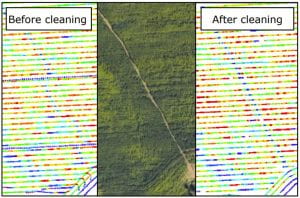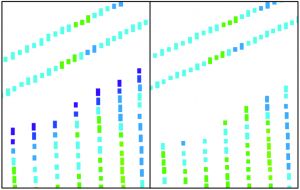by Jodi Putman
Management practices such as variety selection, fertility, and drainage within fields and over time can be evaluated with the use of yield data. However, management decisions using these data are less reliable when there are data errors. Well, some of you may be asking, “What errors”? When a combine equipped with a yield monitoring system is harvesting a field it is collecting “raw yield monitor data”. There are essentially four settings in which error can occur:
Flow delay– Period of time between the crop being cut and the grain/forage being massed.
- If the corn takes 5 seconds to pass from the harvester’s head to the flow sensor, the “flow delay” value is 5 seconds. Sometimes those seconds are not accurately positioned during harvest, therefore producing an inaccurate yield map.
Moisture delay– Period of time between harvest and crop reaching the moisture sensor. Again, a “moisture” map will have a clearer pattern with the correct moisture delay applied similar to (Figure 1).

Start and End Pass delay – Period of time when the harvester is slowing down or ramping up to speed.
- Yield estimates are often much higher or lower than the actual yield when the harvester is speeding up or slowing down.
- “Start Pass” and “End Pass” delays allow for users to remove a set number of unreliable data points from the beginning and end of each harvest pass (Figure 2).

In order to make field and in-field management decisions and assess yield over time, accurate yield data is important. Data cleaning can be completed in one to two hours per farm per year by selecting ten fields with established in-field characteristics, evaluating values for flow, moisture, start and end passes, and batch cleaning to correct errors in all other harvested fields.
We are currently looking to add participants to a regional project to extend our corn and soybean yield potential database. Please contact Field Crops Specialist Jodi Putman at jll347@cornell.edu or call 585-208-8209. For more information visit: http://nmsp.cals.cornell.edu/publications/factsheets/factsheet107.pdf

